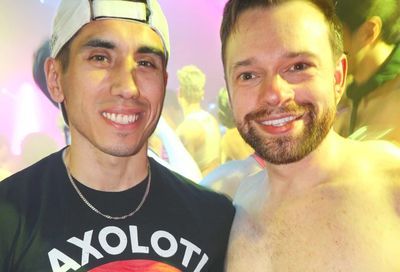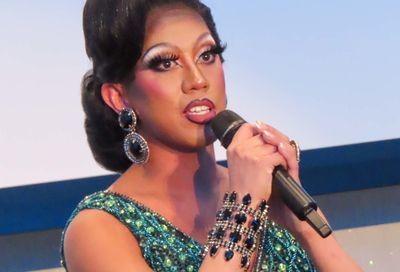LGBTQ students at Christian colleges more likely to experience harassment than their peers
National survey finds LGBTQ students at religious colleges three times as likely to experience anxiety, depression, and suicidal ideation.

A new survey finds that LGBTQ students at Christian colleges and universities are more likely to face bullying and harassment than their heterosexual and cisgender peers.
The survey also finds sexual and gender minorities are more likely to experience feelings of isolation, depression, anxiety, and suicidal ideation, or struggle with substance abuse or eating disorders than their peers.
Conducted by the research firm College Pulse on behalf of the Religious Exemption Accountability Project, the survey canvassed 3,000 full-time students at 134 taxpayer-funded Christian colleges and universities between Jan. 28 and Feb. 6.
Students were asked about any discrimination or harassment they’ve encountered, or one of 11 different potentially-harmful feelings or behaviors they’ve experienced while away at school.
According to the study, LGBTQ students were three times more likely to report experiencing depression and anxiety, and three times more likely to have seriously considered suicide, than their non-LGBTQ peers.
About 12%, or 1 in 8 LGBTQ students reported that their school suggested they receive counseling, suggested they undergo conversion therapy, revoked their financial aid and scholarships, or took other adverse actions against them due to their sexual orientation or gender identity.
Experiences of gender-nonconforming students were particularly negative, with more than 1 in 5 reporting bullying or harassment, compared to 5% of their cisgender peers, and 14% reporting sexual assault, compared to 2% of their cisgender peers.
REAP, whose mission is to advocate for LGBTQ students attending taxpayer-funded religious institutions of higher learning, notes that these troubling statistics are especially relevant considering that one-third of the more than 2,000 four-year colleges and universities in America are religiously-affiliated.
Within that segment, more than 200 Christian colleges and universities have policies that explicitly discriminate against LGBTQ-identifying students, the organization claims.
According to the survey, 30% of respondents attending Christian colleges described experiencing some amount of non-heterosexual attraction or experience and 12% identified themselves as LGBTQ. Even fewer, constituting 2% of those surveyed, identify as non-cisgender.
Of those who identify as LGBTQ, 39% have told fewer than two people about their sexual orientation or gender identity, with 19% having told no one. Only 38% of LGBTQ students, and 30% of gender-minority students, report feeling “comfortable” with their identity on campus.
The report finds that gender-minority students are seven times as likely as their straight peers to have survived a sexual assault and five times more likely to have been bullied harassed, or contemplated suicide.
When posed with 11 “harms” — loneliness, anxiety, depression, suicidal thoughts, bullying or harassment, alcohol use, drug or substance use, physical or sexual assault, sexual harassment, or an eating disorder — more than one-third of LGBTQ students, or 37%, said they’d experienced at least four of those conditions, compared to 13% of non-LGBTQ students.
Conversely, only 17% of LGBTQ students said they experienced none of the conditions, compared to 36% of non-LGBTQ students.
See also: Campus Pride reveals 2020’s “Best of the Best” LGBTQ-friendly colleges
Paul Southwick, a lawyer and the director of REAP, told NBC News that while it may seem counterintuitive to some people that an LGBTQ student would attend a Christian college, he rejects the assumption that LGBTQ students don’t belong at such institutions, noting that many young queer people grow up in Christian communities or may be raised by fundamentalist Christian parents who may influence their children’s decision of which university to attend, particularly in cases where other family members have attended the institution in question.
Southwick also notes that many Christian schools, while private, still receive federal funding in the form of grants and student financial aid — raising questions of whether institutions receiving taxpayer money should be allowed to claim a religious exemption that would justify their decision to discriminate against LGBTQ students.
As it stands now, LGBTQ students at Christian colleges and universities can find themselves targeted by student codes of conduct that prohibit same-sex relationships, gender-nonconformity, or LGBTQ advocacy.
Even something as simple as holding hands or wearing makeup can be grounds for violation, Southwick told NBC News.
One LGBTQ student at Liberty University told researchers that they would feel “physically unsafe” if their sexual orientation became public knowledge, according to the report, telling researchers: “I have overheard people saying, ‘hang the f–s and let them burn.’ … There have been multiple classes that have entire units condemning anyone not cisgender and straight.”

Shane Windmeyer, the executive director and founder of Campus Pride, called the College Pulse survey findings “disturbing,” albeit unsurprising, noting that advocates have known LGBTQ students face higher risks of harassment and difficulty for some time, but the survey’s findings confirm those assertions.
“We’ve long heard stories from students who have been kicked off the campus or who have suffered discrimination or harassment,” he said. “This report just basically puts numbers and statistics to the experience.”
Windmeyer said it was “abhorrent and shameful that anyone who calls himself a Christian would allow this type of discrimination to happen on their campus,” and hoped that the survey’s findings would better inform not only LGBTQ individuals, but straight and cisgender allies, “about the discrimination that exists and the horror stories that this report talks about.”
During the Obama administration, the U.S. Department of Education took a more forceful approach towards ensuring transgender students were not discriminated against, adopting the view (since embraced by the U.S. Supreme Court) that anti-LGBTQ discrimination is a form of sex-based discrimination.
But private colleges receiving federal funding have long been allowed to claim a religious exemption to Title IX’s prohibitions on sex discrimination on religious grounds — a message that was reiterated by policies embraced by the Trump administration, where some Christian universities were told they didn’t even have to apply for an exemption.
President Joe Biden has since asked Secretary of Education Miguel Cardona to review the Trump-era policies and ensure they align with the administration’s view that transgender students are covered by Title IX. However, the administration has not offered specific guidance regarding Title IX, and, specifically, whether religious universities must apply for a religious exemption.
See also: OWU president “proud” to ask for religious exemption to Title IX
But Windmeyer also said that religious exemptions themselves can be based on vague criteria, noting that, even under the Obama administration, schools that cited religious beliefs opposing homosexuality or deviance from gender-based stereotypes (involving women as well as LGBTQ individuals) were often granted exemptions once they applied.
“There was never any college, even during the Obama administration, that was denied a religious exemption, even though some religious colleges are very loosely affiliated with a particular religion,” he said.
“Campus Pride has on our website something called the ‘Worst of the Worst’ list. And it’s basically 104 or 105 campuses that have either applied for or who have gotten Title IX religious exemptions, or who have a track record publicly of discriminating or harassing LGBTQ young people,” Windmeyer told Metro Weekly in an interview. “So we try to track it, we just haven’t been able to track it during the Trump administration because of what I told you, which was, many institutions were told that they don’t have to apply for them any longer.
“I’m hoping the Biden administration will say, every campus, if you’re going to exercise a religious exemption, you must apply for it” he added. “Right now what we’re hearing is they’re reviewing it. I’m hopeful that that will be one of the things out of the review, along with, hopefully, even stronger guidance around LGBTQ young people and that they shouldn’t be discriminated against in higher education.”
Southwick — a graduate of George Fox University, a conservative Quaker school located outside Portland, Oregon that notably sought out a Title IX exemption after a male transgender student applied to live in an all-male dorm — says the intent behind the survey commissioned by REAP was to get hard data on the experiences of LGBTQ students at Christian colleges.
“You often hear isolated incidents popping up in the news, one in Tennessee, another one in California, and son on. As a lawyer, I’ve been representing a lot of these young people behind the scenes when they get expelled or disciplined or whatnot. And I was seeing it continue to happen and actually increase in frequency after marriage equality happened,” Southwick told Metro Weekly.
“What I wanted to do was to get some data to show there are more queer students at these schools than the schools would like you to believe that there are. And they generally they feel alone. They feel like there’s no one else.
“So another big part of the survey was we wanted to get data on was how many of these kids are closeted, and we found out most of them are. That’s why they think they’re the only ones. And then we wanted to highlight the mental health disparities.”
Southwick also wanted to highlight the way in which some colleges and universities, even if they’re not controlled by a religious organization or are only loosely affiliated with a specific religion, are exploiting requests for religious exemptions to justify anti-LGBTQ discrimination.
He is critical of the Department of Education for its overly deferential stance with respect to universities seeking exemptions, arguing that the department has previously refused to review Title IX complaints filed by students alleging discrimination.
Related: Biden executive order calls on Education Department to reassess anti-discrimination policies
“Often times, you don’t have to be Christian at all to enter into [these universities’] degree programs…. But the administration will always go out of their way to grant the exemption,” he said. “And essentially the argument that places like the Becket Fund and Alliance Defending Freedom, they argue that the board of trustees of the school is a religious organization itself and therefore they qualify for the exemption. So basically, it is: the colleges always win, and the kids always lose.”
Southwick told Metro Weekly that the issue of Title IX religious exemptions is likely to be revisited as Congress debates the Equality Act, a comprehensive civil rights bill aimed at prohibiting anti-LGTBQ discrimination.
“Our concern here, and part of why we’re releasing this report now, is because the Equality Act is being debated. And, as I’m sure you know, the religious exemption is going to be a huge area of negotiation,” he said. “We don’t want the mainstream LGBT groups to essentially negotiate away protections that are currently in the Equality Act and that would protect these students if the Equality Act stays the way it’s written.
“We’re very concerned that some of the mainstream groups are going to cave and do a compromise which will have large religious exemptions not only for colleges that receive federal funding, but also hospitals and other things like that, because that’s the only way they’re going to get the 10 Republican senators [to vote for cloture],” he added.
“We don’t want them to do that, because once you pass an Equality Act, once you pass a civil rights statute with a religious exemption, that religious exemption will stay for a very long time and it’s really hard to get rid of.”
Read more:
Minnesota school district to pay $300,000 to transgender student barred from boys’ locker room
Fox News has consistently enabled anti-trans misinformation since Biden took office
LGBTQ advocates launch national campaign to pressure Congress to pass the Equality Act
Support Metro Weekly’s Journalism
These are challenging times for news organizations. And yet it’s crucial we stay active and provide vital resources and information to both our local readers and the world. So won’t you please take a moment and consider supporting Metro Weekly with a membership? For as little as $5 a month, you can help ensure Metro Weekly magazine and MetroWeekly.com remain free, viable resources as we provide the best, most diverse, culturally-resonant LGBTQ coverage in both the D.C. region and around the world. Memberships come with exclusive perks and discounts, your own personal digital delivery of each week’s magazine (and an archive), access to our Member's Lounge when it launches this fall, and exclusive members-only items like Metro Weekly Membership Mugs and Tote Bags! Check out all our membership levels here and please join us today!
























You must be logged in to post a comment.